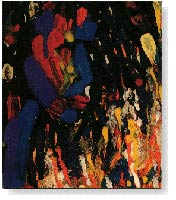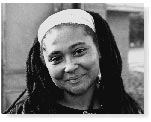|
New poetry by Alice Lovelace
Remembering My Birth: Recent and Collected Poems A review by Gary Alan Fine Athens, Georgia Remembering My Birth: Recent and Collected Poems
Much canonized, academic poetry has a dispassionate air. It speaks from the mind, ignoring cries from the heart, The poet's emotion is swaddled within a bale of polysyllables, bathed in references that speak to the graduate student. This, shall we say, limits its potential audience and the possibility of poetry as a dynamic force for social change. While Robert Frost can surely not be dismissed as an academician, the contrast between his controlled inaugural poem for Mr. Kennedy provides a dramatic contrast with Maya Angelou's rolling rhythms for Mr. Clinton's do. One of the changes in poetry over the decades is the increasing prominence of "performance poetry." Communicating directly with an audience has several effects: first, the poet as person becomes part of interpretation. The race and gender of the poet matter in terms of how meaning is discerned: imagine the context in which one might place an unmarked name such as Pat Williams. A performance poet cannot separate self from words. Second, much emotion is embedded in the style of reading. Some performance readings are exquisite productions - the doing provides the meaning. Third, because of the need for immediate interpretation, poems must be more direct, not puzzles that can only be solved with time. Performance poets do not have that luxury with their readers. Alice Lovelace is one of the most powerful and influential performance poets in Atlanta, having two years ago received the Mayor's Fellowship in the Arts for Literary Arts. Drawing from the rich vein of African performance art, Lovelace refers to herself as an "urban griot," bringing to mind the performers among the Dogon and other West African tribes. It must be confessed that those who have had the thrill of hearing a Lovelace performance will find her printed words leas compelling. Her poetry is fixed in amber, not wafting on the winds. Performed poetry does not yet maintain a HoJo on the information highway. Still, the power of the voice and of the word expresses itself: robust and hardy. She writes of her first marriage ("I'm the one,")
Lovelace is at her most profound when she is personal - personally political. Her more broadly political poems ("Business as Usual", "Winter"), while containing some strong images, do not move as far as those poems that are a cry from the heart ("Remebering My Birth," "Afrikan Sphinx in America," "July 7: Imani Dances Before She Walks"). Images of the soil, the body, the ocean, and the sky inform Lovelace's work; providing the very basic basis for poetry that allows emotion to be felt, not only by the poet, but by the reader. Alice Lovelace represents the private Olympics of the Heart. Dr. Gary Alan Fine is president of the Board of Directors of the Atlanta Writing Resource Center and Professor Of Sociology at the University of Georgia. His book, With the Boys received the Opie prize from the Children's Folklore Section of the American Folklore Society.Cover design (shown above): Omo Olokum - Tempera, 1991, Natchez, Mississippi, by Tunde Afolayan Famous Jr. Artist statement: In Yoruba culture children with locks are considered gifts from The Sea Goddess and spiritually endowed. |
||||
| Published in In Motion Magazine November 10, 1995 |
||||
If you have any thoughts on this or would like to contribute to an ongoing discussion in the  What is New? || Affirmative Action || Art Changes || Autonomy: Chiapas - California || Community Images || Education Rights || E-mail, Opinions and Discussion || En español || Essays from Ireland || Global Eyes || Healthcare || Human Rights/Civil Rights || Piri Thomas || Photo of the Week || QA: Interviews || Region || Rural America || Search || Donate || To be notified of new articles || Survey || In Motion Magazine's Store || In Motion Magazine Staff || In Unity Book of Photos || Links Around The World NPC Productions Copyright © 1995-2020 NPC Productions as a compilation. All Rights Reserved. |



